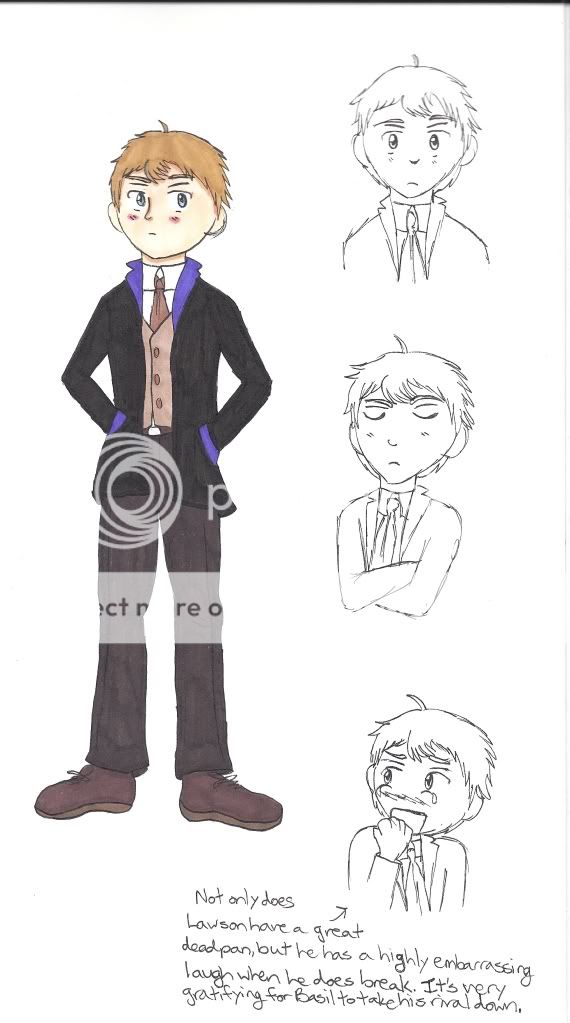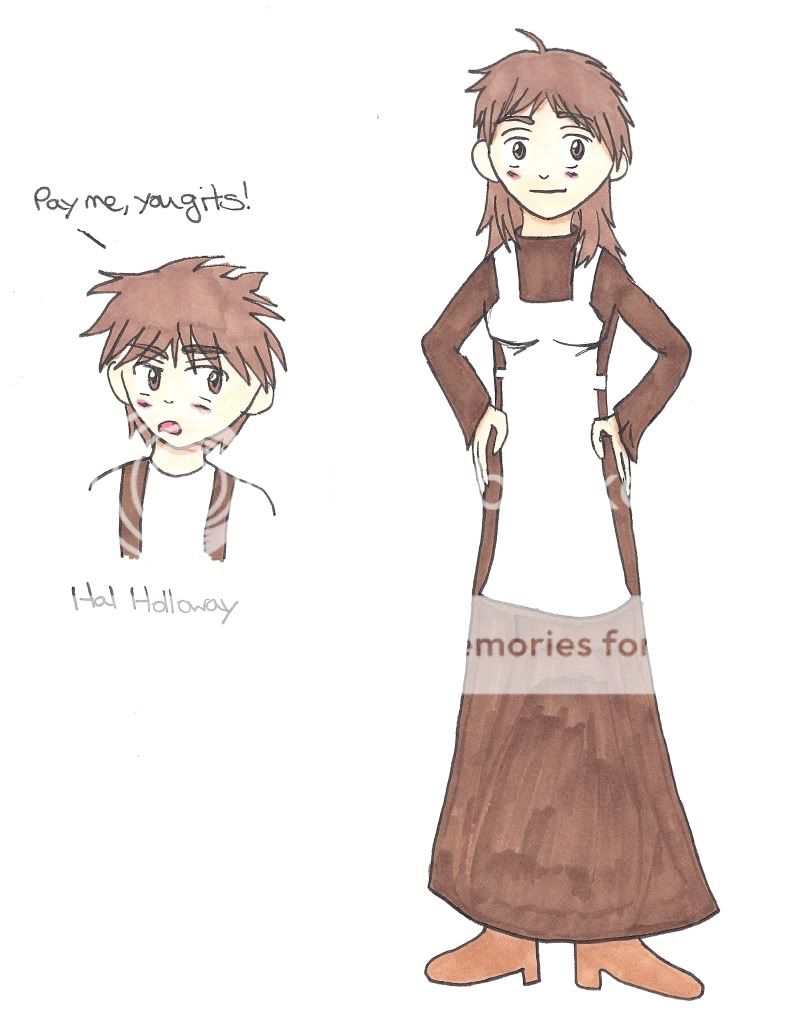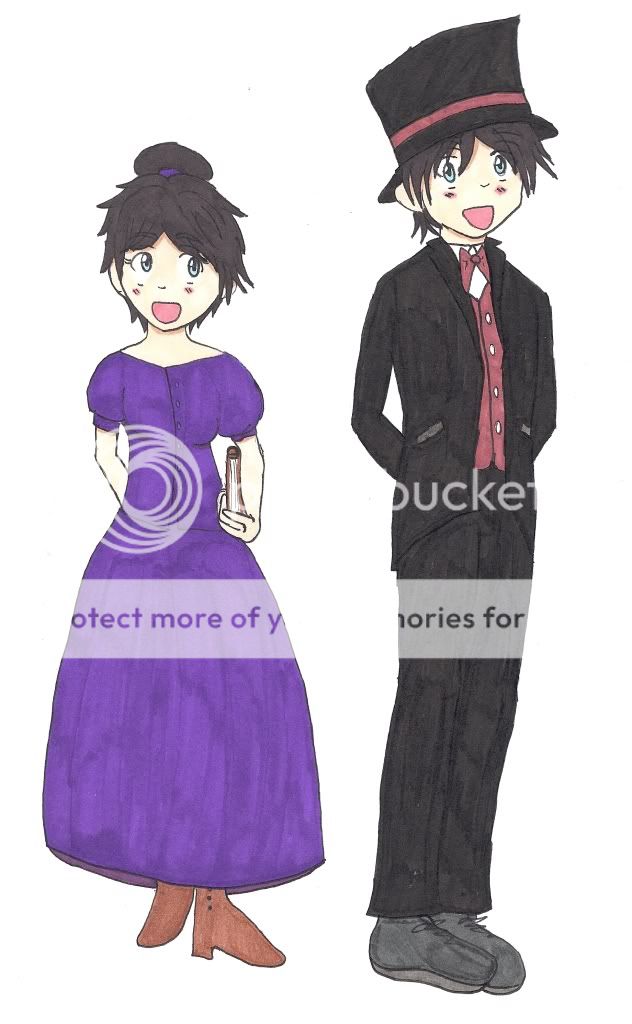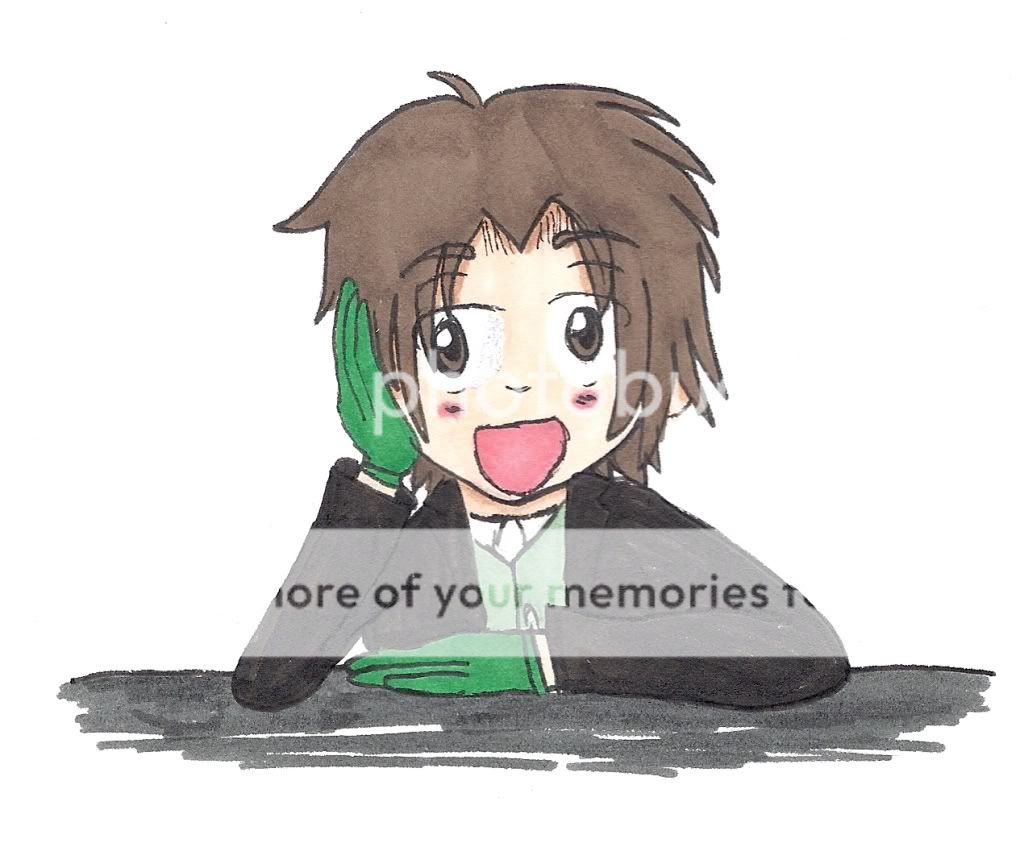Monday, January 9, 2012
Basil and Dustin's favorite person to make fun of in the entire world. Seriously, ask them.
The internet home of Steph Diorio's novel
Basil and Dustin's favorite person to make fun of in the entire world. Seriously, ask them.
Do you know how damn hard it is to draw someone whose face you describe as 'having no personality' and 'plain-looking?' It's harder than drawing someone who is really good-looking or really ugly, seriously.
This should more accurately be titled 'Sebastian Montcourt as a popsicle stick.' He ended up coming out on a really weird angle and it just doesn't look right to me. I scanned it in anyway.
An old friend of Basil's father, John Horner allows Basil to earn his family's money back by working at his bank. Aristocrats typically didn't work in finance, so Horner promises to keep Basil's job hush-hush. (Basil takes the job because it's the fastest way for him to reestablish the family fortune - military service and posts in the House of Lords were more typical aristocrat jobs, but they weren't really designed for people actively trying to make money, if you know what I mean.)
Sybil is one of the newest editions to the Londinium family, so I haven't fully developed her yet. I'll be working on that as I rewrite the earlier chapters of the novel, however.
This one is involved in a pretty major plot point in the second book, so we're not going to go into too many details on him, but what I can tell you is that he was a prefect at Eton at the same time Basil was, so there's a semi-rivalry there already. He's not a villain - not by any means - but he does play a pretty big role, so keep an eye on him once the second book is ready!

Here's one of those things where I went and explored Victorian sexuality. I'm just fascinated by it. These two are one of my forays into the subject.

Annabell and Clara are lesbians in a time period that doesn't really even have a word to describe them. There's a lot of scholarly work out there regarding Victorians and homosexuality due to the existence of Oscar Wilde - the fact is that gays and lesbians existed and had a presence, and that presence threatened the Victorian ideal of hearth and home. I'll cite Jan Marsh, since she explains this better than I do:
Although heterosexuality was held to be both normal and natural throughout the period, the later years also witnessed a visible increase in homosexuality, mainly in men and especially but not exclusively in the intelligentsia. While largely clandestine owing to laws prohibiting 'indecency' in public (the artist Simeon Solomon was one of those so prosecuted), private male homosexual acts were not explicitly and severely legislated against until 1885, when gay sex behind closed doors was made a criminal offence. This led, most notoriously, to the imprisonment in 1896 of Oscar Wilde, playwright and poseur.This was basically the best attempt I could make to tackle this subject. I know it's also a sort of parody of Fingersmith, too, which is an extremely popular book series/television program regarding Victorian lesbians, but I was a lot more interested in exploring Victorians with regards to homosexuality...well, that and keeping Basil single for longer. (Go ahead, fujoshi types, slash him with Dustin. I know you're going to do it.)
Reasons for the emergence of a distinctly gay subculture within 1890s' Decadence movement include the promotion of 'Greek' or Platonic relationships by some university dons; the extended bachelorhood that resulted from prescriptions of financial prudence and sexual continence; and a counter-cultural defiance of orthodox moral teaching, which gave added allure to the forbidden and deviant. The supremely Decadent drawings of Aubrey Beardsley (1872-98) vividly evoke the atmosphere of this moment.
At the very end of the century, questions of sexual identity were also subject to speculative and would-be scientific investigation, dubbed sexology (1902). Writers such as Havelock Ellis (1859-1939) attempted a detailed classification of 'normal' and 'perverse' sexual practices. This led to the identification of a 'third' or 'intermediate' sex, for which Ellis used the term 'sexual inversion'. Writer and social reformer Edward Carpenter (1844-1929), who lived with a younger male partner, adapted the word 'Uranian' (1899) to denote male and female homosexuality, and around the same time, Lesbian and Sapphic came into use as terms for female relationships. Apocryphally, these were also due to be criminalised in the 1885 legislation, until Queen Victoria declared them impossible, whereupon the clause was omitted - a joke that serves to underline a common, and commonly welcomed, ignorance, at a time when lurid, fictionalised lesbianism was often figured as an especially repulsive/seductive French vice.
Today, the best-known lesbian relationship in Victorian Britain has become that of Anne Lister of Shibden in west Yorkshire and her partner, with its distinctly erotic as well as romantic elements. Other couples include poets Katherine Bradley and her niece Edith Cooper, who wrote collaboratively from the 1880s under the name Michael Field, and the Irish writers Edith Somerville and Violet Martin. In the Victorian period itself, American actress Charlotte Cushman and French painter Rosa Bonheur were well known for their openly 'masculine' independence and demeanour.
Emma's the barkeep at the Holloway Inn. She's one of the very first characters I created for Londinium, actually. Her brother, Hal, runs the books at the inn, so there's a little doodle of him off to the side there.

I've always liked Em, namely because she's the girl next door. That and that she's not afraid to beat the crap out of customers who get too rowdy. She's an expert at broken bottle combat, can throw an empty bottle all the way across the bar to knock out patrons by hitting them in the head, and, according to Gib, throws a mean hook. (I like to think that this is what Gib admires most in her.)
Now the only question that remains is how to get her and Gib together on the side since they're both "not interested" right now. Hmm...

Nigel and Arabella are Basil's younger brother and sister, respectively. Nigel's 23 and as the younger son has been taking on various academic posts and traveling the world and all that jazz. By Book Three, we find him working for the British Museum, which is a dream job for him. He's always trying to experiment and invent, as well, and he's kind of sort of obsessed with flight.
Arabella, on the other hand, is only 19. She's a very talented painter, so her sketchbook travels with her often. She's of marrying age, so she's officially on the market. (Imagine the irony if she married 26-year-old William Conrad, also an artist, but...well, a very different kind of artist.)
Oh, and the reason Will's now listed as being 26...I've retconned Basil and Co. to be a little younger. I'm not sure why, but I just felt like it worked a little better for some reason.
 So you like Muse or some other musical group that has some piano backing. I mean, Muse is the obvious example that comes to mind, but there's plenty of musical groups that use piano in their music, so. Anyway, here's the point of this: today we're going to talk about the music that influences people like Muse (and myself, but that's beside the point here).
So you like Muse or some other musical group that has some piano backing. I mean, Muse is the obvious example that comes to mind, but there's plenty of musical groups that use piano in their music, so. Anyway, here's the point of this: today we're going to talk about the music that influences people like Muse (and myself, but that's beside the point here).
So there you are, some pieces that you ought to listen to if you're interested in where Muse's ideas get their basis/inspiration from. Maybe next time I'll do a discussion of arpeggio or something else piano-related, since I actually feel pretty comfortable talking about piano stuff.

There are three of them, and I adore all of them. We've got a different backstory here now, though...
Basically, the Mertons' parents were like many costermongers: constantly arguing. As soon as he could, Gib set up shop on his own and took his sisters with him, thereby raising them himself. As a result, he's fiercely protective of the two of them (Kate's the older one, Sally's the younger one).
Kate's more fashion-forward, whilst Sally, who's about Charlie's age, idolizes her big brother and tries to dress like him (she even wears corduroy pants under her dress). Part of me almost thinks that when she and Charlie grow up, they'd be cute together...hmmm...